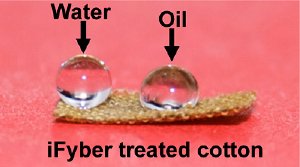Sep 22 2009
Two Cornell researchers have launched iFyber LLC, which markets fabrics with embedded nanoparticles to detect explosives and dangerous chemicals or to serve as antibacterials for hospitals.
 The technology developed at Cornell impart unique properties such as simultaneous water and oil repellency to fabrics while preserving their air permeability and comfort properties.
The technology developed at Cornell impart unique properties such as simultaneous water and oil repellency to fabrics while preserving their air permeability and comfort properties.
Fabrics with embedded nanoparticles to detect counterfeiting devices, explosives and dangerous chemicals or to serve as antibacterials for hospitals, law enforcement or the hospitality industry are just a few of the products that a new company, launched by two Cornell researchers, will produce.
iFyber LLC, begun in fall 2008, uses technology developed through a cross-campus collaboration by fiber science professor Juan Hinestroza and Aaron Strickland, a research associate in the Department of Food Science. The company, which will commercialize this research was launched and funded by KensaGroup LLC in collaboration with the Cornell Center for Technology Enterprise and Commercialization.
The key to iFyber's technology is the ability to deposit nanocoatings on natural and synthetic fibers with nanoscale precision, Hinestroza explained.
"We're using a chemical process to uniformly deposit nanoscopic particles onto the surface of a fabric," he said. "These particles can change the properties of the fabric."
Among the custom properties of the treated fibers are simultaneous water and oil resistance, antimicrobial behavior and electrical conductivity. The company's proprietary coating process allows the nanoparticles to adhere to curved fiber surfaces and crevices with a uniform distribution of particles using traditional textile processing equipment.
"There is significant potential to use this technology in a wide range of applications," said Strickland, director for research and development of iFyber.
To date, the company has received two Small Business Innovative Research Grants from the U.S. Department of Defense for developing custom fabrics using nanotechnology. One project is to develop a material that can detect and identify leaks in chemical warfare suits used by the U.S. Air Force. The second is to create novel antibacterial wound dressings and surgical sutures for the U.S. Navy.
In addition, undergraduate students from Cornell's School of Hotel Administration, under the direction of Professors Robert Kwortnik and Michael Sturman, conducted a preliminary market analysis on using the technology to create antibacterial bedding and linens for the hospitality industry. "We are waiting further market analysis before moving into the linen market," he said.